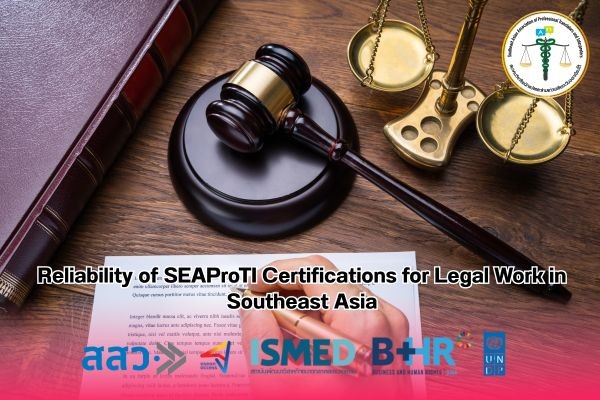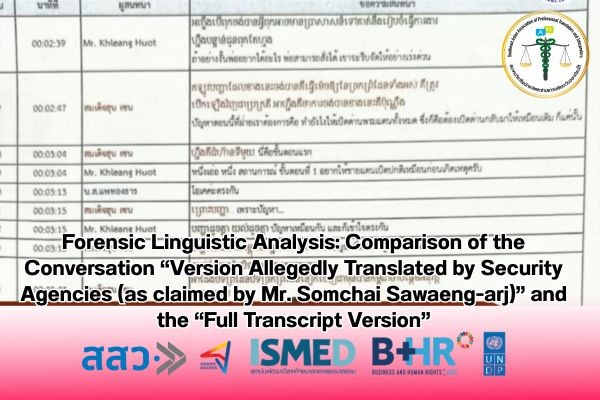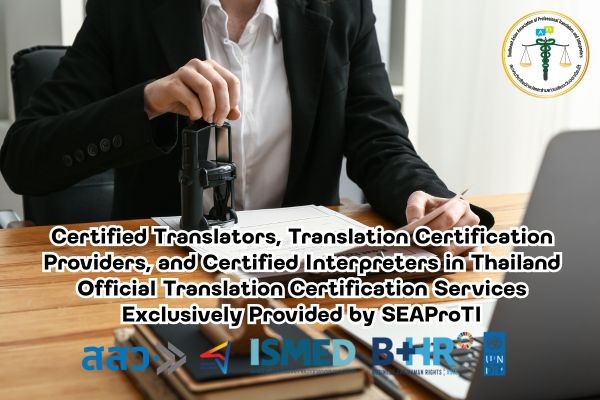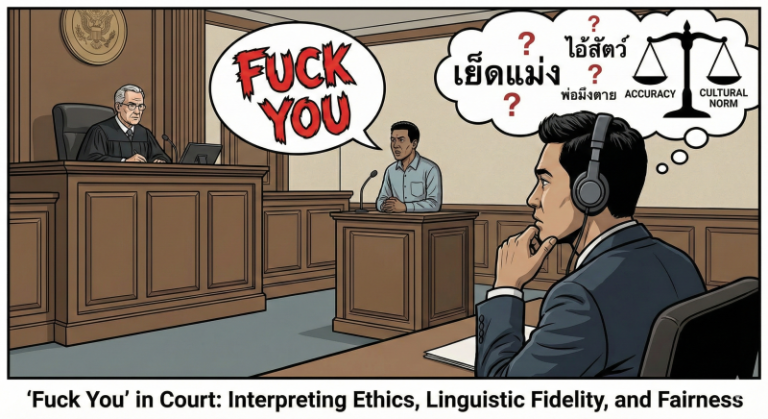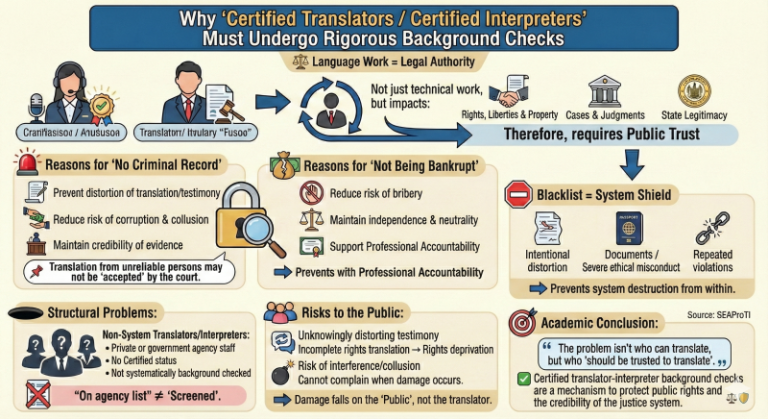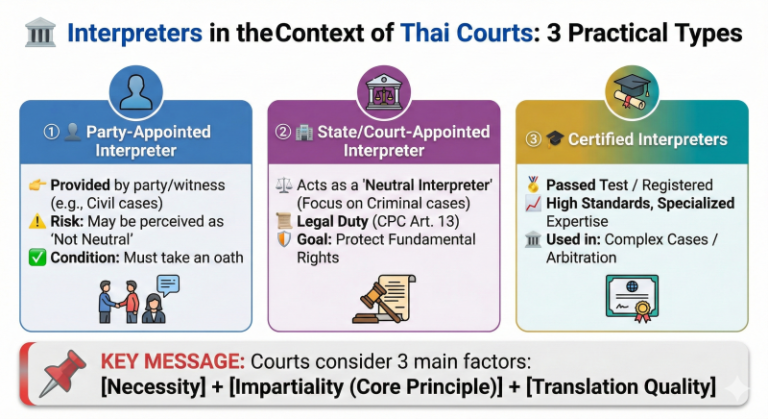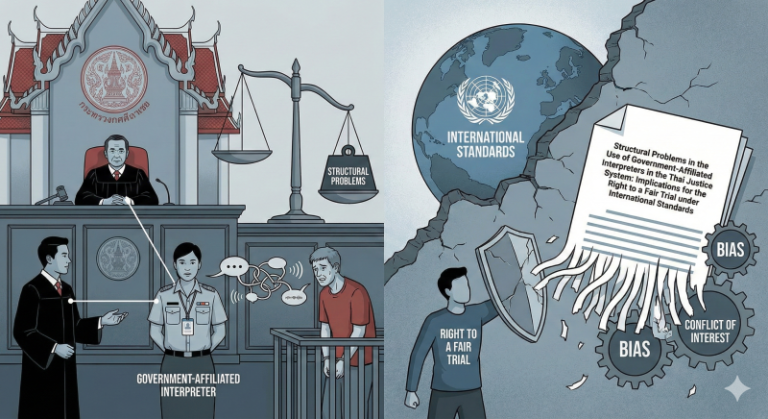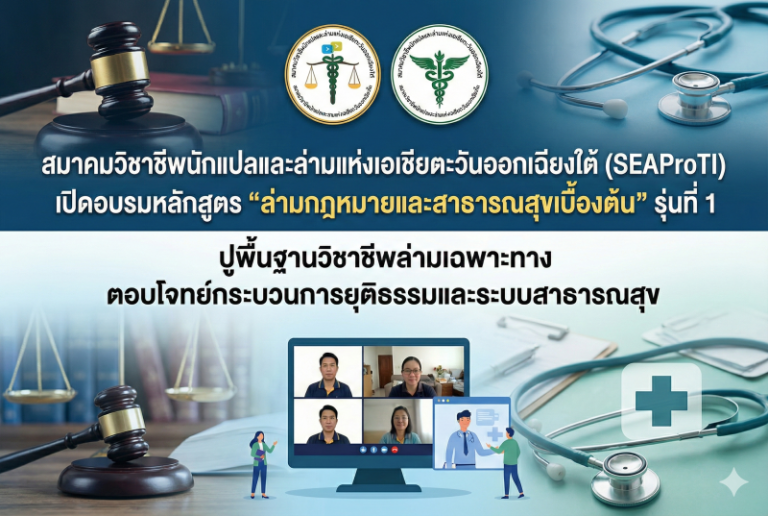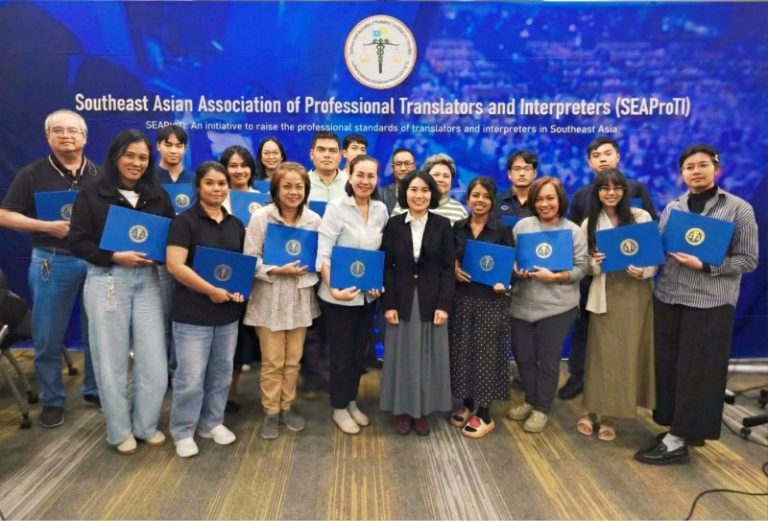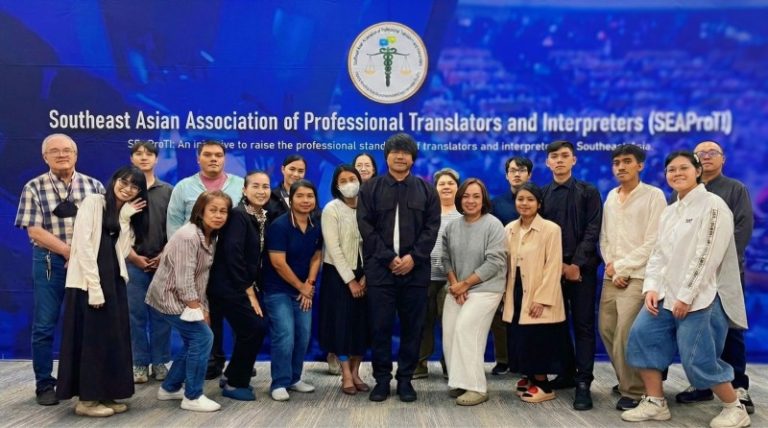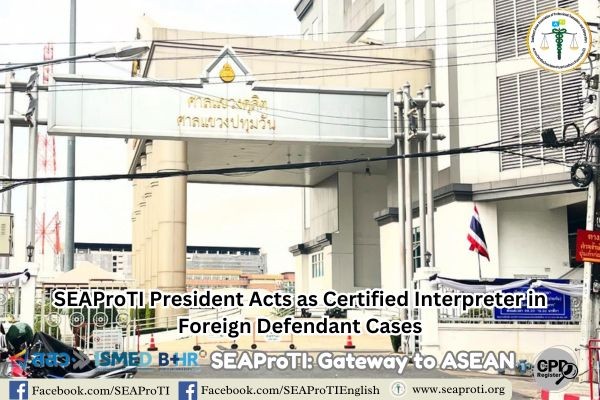Reliability of SEAProTI Certifications for Legal Work in Southeast Asia
Author: Wanitcha Sumanat, the president of the Southeast Asian Association of Professional Translators and Interpreters (SEAProTI)
10 August 2025, Bangkok, – This article examines the reliability of certifications issued by the Southeast Asian Association of Professional Translators and Interpreters (SEAProTI) in legal and administrative contexts in Southeast Asia. Drawing on Thai regulatory publications, institutional recognition patterns, and professional vetting procedures, it analyzes how SEAProTI certifications function as a credibility marker in courts, government agencies, and cross-border legal processes. The paper further outlines limitations and jurisdictional considerations, offering practical guidance for legal practitioners and clients engaging in multilingual legal transactions.
Introduction
In an increasingly interconnected Southeast Asian legal landscape, the reliability of translator and interpreter certifications plays a critical role in the validity of multilingual legal documents (Chan, 2020; Rundle, 2022). SEAProTI has emerged as a prominent professional body in Thailand, with certifications that align with official government frameworks and demonstrate structured quality assurance. This study evaluates the extent to which SEAProTI certifications are accepted and relied upon in legal work within Thailand and, to varying degrees, across the region.
Alignment with Official Thai Publications
SEAProTI’s certification criteria for Certified Translators, Translation Certification Providers, and Certified Interpreters are formally aligned with entries published in the Royal Thai Government Gazette dated 25 July 2024 (Volume 141, Part 66 Ng, p. 100). This legal referencing reinforces acceptance by Thai courts and government agencies, particularly in the context of visa applications, business registrations, and consular legalization procedures (Royal Thai Government Gazette, 2024).
Professional Standards and Verification
The SEAProTI certification framework entails a multi-step vetting process, including identity verification, academic credential review, language proficiency testing, compulsory training, and peer-review of substantial translation samples. Credentials are subject to renewal contingent on continuing professional development (CPD) and adherence to a code of ethics, with provisions for suspension or revocation in cases of misconduct. These measures reflect international best practices in translator certification (Byrne, 2017; Pym et al., 2012).
Institutional and Practical Acceptance
SEAProTI’s certified professionals are listed in its public directory, which is referenced in consular and legalization workflows. This practical visibility suggests an operational level of trust in administrative contexts (SEAProTI, 2024a). Additionally, Thai ministerial circulars have acknowledged the role of translators and interpreters meeting SEAProTI standards, signaling institutional reliance in official matters (SEAProTI, 2024b).
Limitations and Jurisdictional Considerations
Country-Specific Acceptance
Outside Thailand, legal acceptance of SEAProTI certifications varies according to the rules of the receiving jurisdiction. For instance, certain Southeast Asian countries maintain their own sworn-translator registries or court-appointed interpreter systems (Lee, 2019). Consequently, SEAProTI credentials may need to be supplemented by local accreditation or legalization processes.
Thai Framework Nuances
Thailand does not operate a statutory national registry of licensed translators; acceptance is often based on recognized professional standards and the credibility of the certifying body. In this environment, SEAProTI acts as a de facto standard-setter, but not a legally mandated licensing authority.
Verification Requirements
SEAProTI issues certification seals, unique identifiers, and publishes validity periods. Legal practitioners are advised to verify active status and ensure documents bear the appropriate stamp or signature to mitigate risks of rejection.
Practical Guidance for Legal Use
In Thailand: SEAProTI-certified translators/interpreters are generally sufficient for court submissions, ministry filings, consular legalizations, visa applications, and corporate registrations, provided credentials are valid and documents bear SEAProTI authentication marks.
In Cross-Border Matters: Legal acceptance should be confirmed with the receiving authority in advance. SEAProTI credentials can form part of a compliance package that includes legalization, apostille certification, or adherence to local sworn-translator requirements.
Conclusion
SEAProTI certifications represent a credible and practically accepted trust signal for legal work in Thailand. Their recognition across Southeast Asia is growing but remains subject to jurisdiction-specific rules. When combined with proper verification and legalization procedures, SEAProTI credentials can facilitate reliable multilingual legal communication within the region’s diverse legal systems.
References
- Byrne, J. (2017). Professional translator training in a global context. Routledge.
- Chan, A. (2020). Translating law in multilingual legal systems: Professional standards and institutional trust. Journal of Legal Translation Studies, 12(2), 45–67.
- Pym, A., Grin, F., Sfreddo, C., & Chan, A. (2012). The status of the translation profession in the European Union. European Commission.
- Royal Thai Government Gazette. (2024, July 25). Criteria for Certified Translators, Translation Certification Providers, and Certified Interpreters (Vol. 141, Part 66 Ng, p. 100).
- SEAProTI. (2024a). Practitioners directory. Southeast Asian Association of Professional Translators and Interpreters. https://www.seaproti.org/Practitioners
- SEAProTI. (2024b). Guidelines for legal and consular translation certification. Southeast Asian Association of Professional Translators and Interpreters.
- Rundle, C. (2022). Translation and the law: Authority, trust, and the role of certification. Meta: Translators’ Journal, 67(3), 591–608.
About Certified Translators, Translation Certification Providers, and Certified Interpreters of the Southeast Asian Association of Professional Translators and Interpreters (SEAProTI)
The Southeast Asian Association of Professional Translators and Interpreters (SEAProTI) has established criteria and qualifications for those registered as “Certified Translators,” “Translation Certification Providers,” and “Certified Interpreters” of the Association, as stipulated in Sections 9 and 10 in the Royal Gazette of the Secretariat of the Cabinet, Office of the Prime Minister of the Kingdom of Thailand, dated 25 July 2024, Volume 141, Part 66 Ng, page 100. Full text available at: The Royal Thai Government Gazette
ความน่าเชื่อถือของการรับรองโดย SEAProTI สำหรับงานด้านกฎหมายในเอเชียตะวันออกเฉียงใต้
โดย วณิชชา สุมานัส นายกสมาคมวิชาชีพนักแปลและล่ามแห่งเอเชียตะวันออกเฉียงใต้ (SEAProTI)
10 สิงหาคม 2568, กรุงเทพมหานคร – บทความนี้ศึกษาความน่าเชื่อถือของการรับรองคุณวุฒิที่ออกโดยสมาคมวิชาชีพนักแปลและล่ามแห่งเอเชียตะวันออกเฉียงใต้ (SEAProTI) ในบริบทของงานด้านกฎหมายและงานด้านธุรการในภูมิภาคเอเชียตะวันออกเฉียงใต้ โดยอ้างอิงข้อมูลจากเอกสารราชการของไทย การยอมรับจากสถาบันต่าง ๆ และกระบวนการประเมินคุณภาพอย่างเป็นระบบ บทความนี้วิเคราะห์บทบาทของการรับรองดังกล่าวในฐานะเครื่องยืนยันความน่าเชื่อถือสำหรับศาล หน่วยงานภาครัฐ และการดำเนินคดีหรือธุรกรรมที่เกี่ยวข้องกับหลายประเทศ พร้อมระบุข้อจำกัดและข้อพิจารณาตามเขตอำนาจศาล รวมถึงข้อแนะนำเชิงปฏิบัติสำหรับผู้ใช้บริการด้านกฎหมายในบริบทพหุภาษา
บทนำ
ในสภาพแวดล้อมทางกฎหมายของเอเชียตะวันออกเฉียงใต้ซึ่งมีความเชื่อมโยงระหว่างประเทศเพิ่มมากขึ้น ความน่าเชื่อถือของการรับรองนักแปลและล่ามมีความสำคัญอย่างยิ่งต่อความถูกต้องและผลทางกฎหมายของเอกสารหลายภาษา (Chan, 2020; Rundle, 2022) SEAProTI ได้กลายเป็นองค์กรวิชาชีพที่มีบทบาทสำคัญในประเทศไทย โดยมีการรับรองที่สอดคล้องกับกรอบของภาครัฐและแสดงให้เห็นถึงกระบวนการควบคุมคุณภาพอย่างเป็นระบบ บทความนี้ประเมินระดับการยอมรับและความน่าเชื่อถือของการรับรองโดย SEAProTI ทั้งในประเทศไทยและในบางกรณีในภูมิภาค
ความสอดคล้องกับประกาศราชกิจจานุเบกษา
เกณฑ์การรับรองของ SEAProTI สำหรับนักแปลรับรอง ผู้รับรองการแปล และล่ามรับรอง ได้อ้างอิงตามประกาศใน ราชกิจจานุเบกษา ลงวันที่ 25 กรกฎาคม 2567 (เล่ม 141 ตอน 66 ง หน้า 100) การอ้างอิงทางกฎหมายเช่นนี้ช่วยเสริมความน่าเชื่อถือในศาลและหน่วยงานรัฐของไทย โดยเฉพาะในกระบวนการขอวีซ่า การจดทะเบียนธุรกิจ และการรับรองเอกสารกงสุล (Royal Thai Government Gazette, 2024)
มาตรฐานวิชาชีพและการตรวจสอบ
กรอบการรับรองของ SEAProTI มีขั้นตอนประเมินหลายขั้นตอน ได้แก่ การยืนยันตัวตน การตรวจสอบวุฒิการศึกษา การทดสอบความสามารถทางภาษา การฝึกอบรมภาคบังคับ และการทบทวนผลงานแปลขนาดใหญ่โดยผู้ทรงคุณวุฒิ การต่ออายุการรับรองต้องมีการพัฒนาวิชาชีพอย่างต่อเนื่อง (CPD) และการปฏิบัติตามจรรยาบรรณ พร้อมกลไกพักใช้หรือเพิกถอนเมื่อพบการกระทำผิด ซึ่งสอดคล้องกับมาตรฐานสากลของการรับรองนักแปล (Byrne, 2017; Pym et al., 2012)
การยอมรับในเชิงสถาบันและการใช้งานจริง
ผู้ประกอบวิชาชีพที่ได้รับการรับรองจาก SEAProTI จะปรากฏในสารบบสมาชิกของสมาคม ซึ่งถูกอ้างถึงในกระบวนการกงสุลและการรับรองเอกสาร สะท้อนถึงการยอมรับในเชิงปฏิบัติในหน่วยงานธุรการ (SEAProTI, 2024a) นอกจากนี้ หนังสือเวียนของกระทรวงต่าง ๆ ในไทยยังกล่าวถึงการใช้บริการนักแปลและล่ามที่มีคุณสมบัติตามมาตรฐานของ SEAProTI ซึ่งบ่งบอกถึงการพึ่งพาในระดับราชการ (SEAProTI, 2024b)
ข้อจำกัดและข้อพิจารณาในแต่ละเขตอำนาจ
นอกเหนือจากประเทศไทย การยอมรับทางกฎหมายของการรับรองโดย SEAProTI แตกต่างกันตามกฎของหน่วยงานปลายทาง บางประเทศในเอเชียตะวันออกเฉียงใต้ยังคงใช้ระบบนักแปลสาบานตน (sworn translator) หรือการแต่งตั้งล่ามโดยศาล (Lee, 2019) ทำให้จำเป็นต้องมีการรับรองเสริมตามข้อกำหนดของท้องถิ่น
ประเทศไทยไม่มีทะเบียนนักแปลที่ออกโดยรัฐอย่างเป็นทางการ การยอมรับจึงมักอิงกับมาตรฐานวิชาชีพและความน่าเชื่อถือขององค์กรผู้รับรอง ในบริบทนี้ SEAProTI ทำหน้าที่เสมือนผู้กำหนดมาตรฐาน แม้จะไม่ได้เป็นหน่วยงานที่ออกใบอนุญาตตามกฎหมาย
SEAProTI ออกตราประทับรับรอง รหัสประจำตัว และประกาศระยะเวลาการรับรองต่อสาธารณะ เพื่อความปลอดภัย ผู้ใช้บริการด้านกฎหมายควรตรวจสอบสถานะการรับรองและให้แน่ใจว่าเอกสารมีตราประทับและลายเซ็นครบถ้วนเพื่อลดความเสี่ยงในการถูกปฏิเสธ
- ในประเทศไทย: การใช้บริการนักแปล/ล่ามที่ได้รับการรับรองจาก SEAProTI มักเพียงพอสำหรับการยื่นเอกสารต่อศาล กระทรวง การรับรองเอกสารกงสุล การขอวีซ่า และการจดทะเบียนบริษัท โดยต้องตรวจสอบว่าการรับรองยังมีผลบังคับและเอกสารมีตราสัญลักษณ์ของ SEAProTI
- ในงานข้ามพรมแดน: ควรตรวจสอบเกณฑ์การยอมรับของหน่วยงานปลายทางล่วงหน้า การรับรองของ SEAProTI สามารถเป็นส่วนหนึ่งของแพ็กเกจการปฏิบัติตามกฎหมายควบคู่กับการรับรองเอกสาร (legalization) การประทับตรา Apostille หรือการใช้บริการนักแปลสาบานตนในท้องถิ่น
การรับรองโดย SEAProTI เป็นเครื่องยืนยันความน่าเชื่อถือที่ได้รับการยอมรับอย่างแพร่หลายในประเทศไทย และมีแนวโน้มการยอมรับเพิ่มขึ้นในภูมิภาค แม้ยังขึ้นอยู่กับข้อกำหนดของแต่ละประเทศ เมื่อรวมกับการตรวจสอบสถานะและขั้นตอนการรับรองเอกสารที่เหมาะสม การรับรองของ SEAProTI สามารถอำนวยความสะดวกให้การสื่อสารด้านกฎหมายในสภาพแวดล้อมพหุภาษาของภูมิภาคได้อย่างมีประสิทธิภาพ
บรรณานุกรม
- Byrne, J. (2017). Professional translator training in a global context. Routledge.
- Chan, A. (2020). Translating law in multilingual legal systems: Professional standards and institutional trust. Journal of Legal Translation Studies, 12(2), 45–67.
- Pym, A., Grin, F., Sfreddo, C., & Chan, A. (2012). The status of the translation profession in the European Union. European Commission.
- Royal Thai Government Gazette. (2024, July 25). Criteria for Certified Translators, Translation Certification Providers, and Certified Interpreters (Vol. 141, Part 66 Ng, p. 100).
- SEAProTI. (2024a). Practitioners directory. Southeast Asian Association of Professional Translators and Interpreters. https://www.seaproti.org/Practitioners
- SEAProTI. (2024b). Guidelines for legal and consular translation certification. Southeast Asian Association of Professional Translators and Interpreters.
- Rundle, C. (2022). Translation and the law: Authority, trust, and the role of certification. Meta: Translators’ Journal, 67(3), 591–608.
สมาคมวิชาชีพนักแปลและล่ามแห่งเอเชียตะวันออกเฉียงใต้ (SEAProTI) ได้ประกาศหลักเกณฑ์และคุณสมบัติผู้ที่ขึ้นทะเบียนเป็น “นักแปลรับรอง (Certified Translators) และผู้รับรองการแปล (Translation Certification Providers) และล่ามรับรอง (Certified Interpreters)” ของสมาคม หมวดที่ 9 และหมวดที่ 10 ในราชกิจจานุเบกษา ของสำนักเลขาธิการคณะรัฐมนตรี ในสำนักนายกรัฐมนตรี แห่งราชอาณาจักรไทย ลงวันที่ 25 ก.ค. 2567 เล่มที่ 141 ตอนที่ 66 ง หน้า 100 อ่านฉบับเต็มได้ที่:


